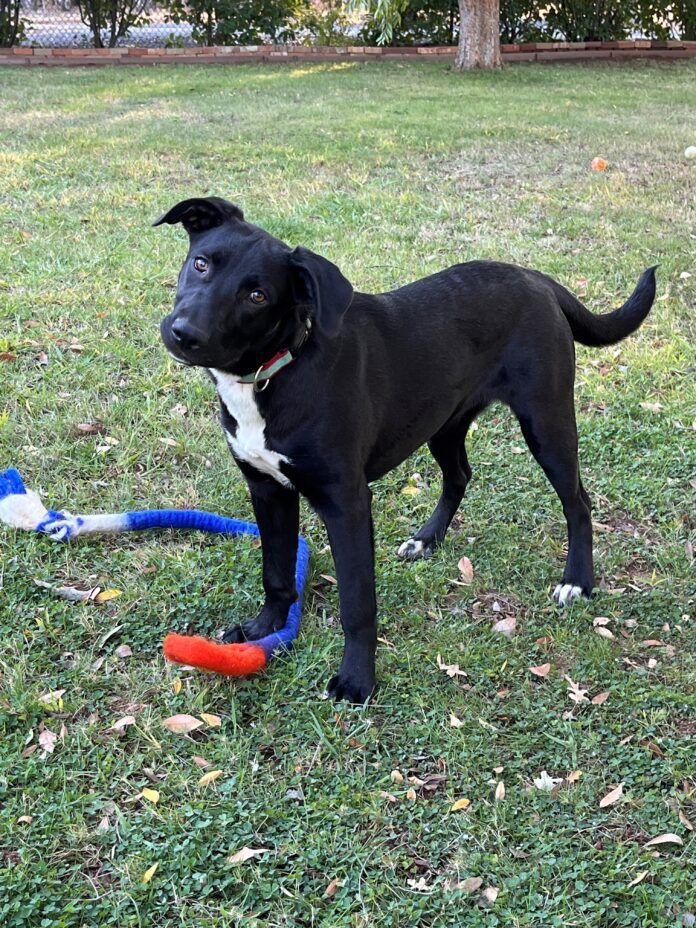A couple of weeks ago, I took apart the Great Dane-sized crate that’s been living in my office and said I was taking a break from fostering. And then, as these things tend to go, I found myself putting the crate back together again.
A 7-month-old Lab/German Shepherd-mix got adopted by a woman who quickly became overwhelmed by the dog’s over-exuberant, physical interaction. She was jumping up, mouthing, and nipping. If the woman sat down, the dog would leap into her lap and start rough, physical play. And the dog was going to the bathroom all over the house! The adopter called the shelter, asking for a referral to a trainer, and they gave her my number. When she called me, sobbing, she admitted that she was thinking of bringing the dog back to the shelter, because she was just too much! But at the same time, the woman already loved the dog and didn’t want her to be at risk of euthanasia if she was returned!
I visited the woman in her home to assess the dog and the situation. Yes, the dog jumps and is mouthy, but she stopped these rude behaviors when I kept turning my back to her. The dog is not going to be huge and she’s smart; I had her offering sit and down and calmly accepting petting (with all four feet on the floor) within just a few minutes. The woman was equipped with a large crate (though she hadn’t been able to get the dog to quiet down in there, so she gave up on crating her). She had a large yard (though the fence needs some work). And she works a split shift, so she could actually come home in the middle of her work day to let the dog out of a crate and take her for a walk (if she could get her into the crate and get her to tolerate the crate, and work on her leash manners).
It wasn’t hopeless. But the dog, who had been in the shelter for four months, needs to learn a ton before she’s going to be much fun to live with. Because I think it’s possible for the dog and woman to work things out, and because I don’t want to see this dog go back to the shelter (where her prospects at this awkward age in a shelter crowded with younger, cuter puppies are not good), and because the woman can’t possibly afford all the training this youngster needs to be bearable to live with ASAP, I offered to foster her for a couple weeks. This would give the woman time to work on her fence and think about whether she’s really up for the challenge, and give the dog some training and manners so she’d be more adoptable if the woman does decide to return her to the shelter. She readily agreed.
Over the past decade or so, I’ve mostly fostered puppies who were less than 8 weeks old, keeping them until they were old enough to have spay/neuter surgery and get adopted. But when I first started fostering for my local shelter, I used to take on one ignorant teenaged dog after another, and teach them a few basic cues (sit, down, wait, and come), how to politely greet other dogs and humans, and to follow house rules (No helping yourself to human belongings! No counter-surfing! No going potty in the house!), until they could be presented to potential adopters as reasonably civilized young dogs. It’s not the most enjoyable type of fostering—but it’s demonstrably more critically needed.
When we raise puppies in our homes, they learn and absorb so much more than we think they do. We are aware that we are educating them when we teach them sit and down and come and when we carefully introduce them to leashes and collars and harnesses. But we don’t really think about the education that they are also receiving about not helping themselves to food off the counter, about not walking exactly in front of humans, that the sofa is best approached from the front (not over the back), that the TV is not a threat (no matter how loud it is or what scary sounds come from it), that one should not jump into humans’ faces when they are petting you (or when they are just bending over to put their shoes on), and a million other things. My foster puppies get adopted knowing all those things without my actively teaching them any of it.
In contrast, though, when a puppy gets raised in the shelter, and lingers in the kennel wards well into adolescence—like far too many dogs in crowded shelters today—their incorporation into a human home (if they are lucky enough, lacking manners, to appeal to an adopter) rarely goes smoothly. They are larger, stronger, and more independent than tiny puppies, and at the developmental stage when they have interests and a will of their own. No longer are they happy to toddle along and follow their humans everywhere; adolescent dogs are quick to judge a situation as unsatisfying or boring and pursue something more to their own tastes. Sleep in the closed-off kitchen? Why, when you are strong enough to push that gate over? Settle for the food they served you hours ago? Why, when you can easily reach all the food on the counter, in the breadbox, in the garbage can, and the cat’s litter box? Speaking of cats, is there anything more fun than chasing them through the house?
As I’ve been living with this very cute, sweet, friendly 7-month-old foster dog, I find myself grumbling to myself, calling her names (in my head, not out loud). “Oh, you idiot!” I think to myself when she wraps her leash around her legs and falls to the ground in front of me as I’m carrying things to the car, or steps into the water bowl on the kitchen floor, making it flip over and flood the room, or tries to run out the front door as it’s swinging closed and gets momentarily squashed, or stretches and falls off the couch, knocking into a side table and spilling the drink that was on it, or leaping into the air barking wildly because of the song that the clothes dryer made at the end of its cycle. She’s a dope! Only, not really! It’s not her fault that she didn’t have the opportunity to learn about doors and leashes and water bowls when she was a little puppy, and the consequences were tiny inconveniences. Now she’s big and rough and when she spontaneously—playfully!—paws at you and accidentally gets you in the face, it hurts!
No wonder that so many newly adopted adolescent dogs get returned to the shelter, many within a single day! I’m a very experienced dog handler, and I love dogs, but I can’t say I love this experience—and if I find it annoying at times, I can only imagine how daunting a relatively inexperienced adopter finds it.
But she’s also smart, learning fast, cute, and funny. She loves fetch, loves to play tug, is very careful with her mouth, loves being snuggled, and has been so good at listening to my recall cues and following along with my dogs on walks in our off-leash wildlife area, that I let her off leash on the very first walk she joined us for. She’s going to be a joy—with a couple more weeks of habituating to a human home.
So, even though I’m not making it sound like much fun, I have to recommend the experience. I know that the things this dog is learning are going to make the difference between getting adopted and having a good life, or leaving the shelter, lifeless, out the back door. And having been called and asked for help, I can’t turn my back on a dog who has the potential to be a very good one.
Will you answer the call for help fostering a needy dog at your local shelter?







Nancy, thank you so much for this! I love your writing, and all your articles, and especially love that you frequently encourage folks to volunteer at their local shelter. Many people have no idea what a huge difference they can make in the lives of countless animals and the people who adopt them—by volunteering, fostering, and even donating money or supplies. I’ve been volunteering at my local shelter for a minimum of 20 hours a week for 19 years, and also used to foster (until one of my foster “fails” put her paws down and said she has to be an only child). It’s the best work I’ve ever done, especially now that I’ve retired from my paying job and can concentrate more on working with the “at risk” adolescent dogs at my shelter. Your writing is persuasive, compelling, and often entertaining—and I’m sure it’s incredibly instrumental in people’s opinions of shelters and considering how they can help. I also loved the WDJ article on the use of the term “no kill” when talking about shelters and rescue groups. My local shelter is the only open admission shelter in our county, so you can imagine how overcrowded we are with all the animals that the so-called “no kill” facilities and rescues won’t take. In addition to our domestic animal shelter, we also have a wildlife rehab center and a farm facility for surrendered and stray farm animals. Needless to say, our resources are stretched very thin, and we need all the volunteers and financial help we can get. I truly believe that the more often WDJ publishes articles, etc., about shelters, the more likely it is that folks will consider helping out locally. Thank you SO much for all you do!
Thank you for this. I suspect you are not only saving a dog but also saving the owner. This dog is going to bring joy to her life, likely that she didn’t know she needed. I’m glad the woman reached out for help rather than just giving up and returning the dog, well puppy really. To me they are either puppies or adult dogs. Even the teenagers are puppies, just big, clumsy, stupid ones. Yes, the teenage years are vexing but once you are over that hump they are so wonderful you forget the aggravation.
I’ve got two now and after they finally pass I’m likely going to foster after that. I’ve got a fenced yard, front and back (8 feet in back) with double gates and a foundation preventing digging out. I have future plans for installation of a doggy door that will require replacing the kitchen door. I may start fostering after my larger dog passes (she’s 6) so that my younger dog can help the fosters to socialize and learn the ropes. I’m 70 and after 30+ years of owning dogs I cannot live without one, but I’m also hesitant to take on a dog that might outlive me.
Ah, the adolescent years! I took on a 6 month old rescued from a situation where she was no longer wanted and crated all the time. I’m pretty sure the crating started when she grew out of the easy to control puppy stage. I had forgotten how exuberant an adolescent is! Oh my! She was a terror when she arrived. It took her over a month before she would even make eye contact and our poor 9 yr old dog got rammed and bowled over more than once before he wised up and now watches for her flying by ( she jumps over him often even though he’s a few inches taller!). Shes going to be a great dog but the journey there is something else! We just finished puppy obedience class and will continue with intermediate next month.